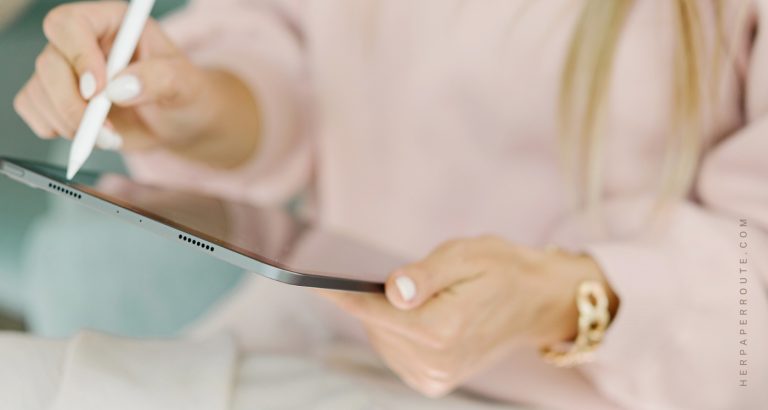How to Have a Productive Study Day
Whether you are a student studying for an exam, or an entrepreneur studying the competition in your market – you need to know how to have a productive study day.
Do you find it difficult to concentrate for long periods of time? How about staying motivated during your study session?
As an affiliate partner of various brands and sponsored content, HerPaperRoute may earn commission on qualifying purchases. Disclaimer
If this describes you, then read on for five simple tips on how to have a productive study day.
All of us have days when we can’t seem to get anything done. It’s not the end of the world, but it sure does feel like it sometimes.
But you don’t have to accept that feeling!
These are some simple steps that will help you stay motivated and focused throughout the day, resulting in excellent business growth or grades!
How to Have a Productive Study Day
How many times have you planned out your study schedule for the week, but then find yourself procrastinating and not getting anything done?
Whether it is because of schoolwork or just trying to get ahead on your own personal projects, studying can be a difficult task, especially if you’re just trying to get through it and not really enjoying the process.
Here is an effective step-by-step guide on how to have a productive study day:
Step 1: Plan the Day Before.
“Failing to plan is planning to fail”
Benjamin Franklin
The first step toward a productive study day is to plan it the night before, because, when you think about the future, you’re probably thinking about how you’ll be super productive and get everything done.
However, when you plan the day when you’ll actually face those tasks head-on, the procrastination mindset takes over and you feel like planning nothing because you don’t want to do anything.
So, you need to plan your study day the day before.
How many hours will you dedicate to studying?
What will your schedule look like for each hour of dedicated study time?
This is important so you know what needs to be done and how much work you need to get done, as well as so you don’t spend too much time on one subject.
Planning your day the night before will help you wake up more prepared and ready to begin studying for a productive study session that will not leave you exhausted halfway through!
It’s also important not to overschedule yourself, as this can be just as damaging, so plan ahead of time.
You might enjoy: 9 Things To Do Every Sunday For A Productive Week
Step 2: Schedule your Tasks
To begin, make a list of all of the tasks you need to complete, as well as any upcoming events.
Then, for each task, estimate how long it will take you to complete it.
In this case, it’s better to overestimate than underestimate.
Finally, make a schedule for everything, which you can do in your planner.
The order in which you schedule tasks is entirely up to you, but here are a few suggestions.
First and foremost, schedule the tasks that require the most willpower to complete during the times of day when you are most motivated and energetic.
This is usually at the start of your study session, but it can also depend on what time of day you work best.
Tip number two: If you intend to exercise, schedule it earlier in the day.
This will get your blood pumping and keep you focused for the rest of the day.
Read next: How To Stop Being Lazy: 7 Powerful Steps To Overcome Procrastination
Step 3: Have a Designated Workspace.
Find or make a study/workspace where you can be productive without being distracted or interrupted by others.
You should also have separate areas for studying and relaxing.
If you study from home, the best thing you can do is to keep your workspace separate from your bedroom.
However, if you live in a house with other people (as I do), this may be difficult.
As a result, you’ll need to establish some boundaries with the people you live with.
Make it clear, for example, that you do not want to be interrupted during your studying hours unless it is an emergency.
Also, try to get all of your supplies ready beforehand. This way, you won’t have to interrupt your own workflow to go get something.
Let’s try to keep your workspace as clean and minimalistic as possible now that you have one.
Keep a clean and tidy desk, and get rid of anything that might distract you. Keep only the essentials on your desk at all times (and a bottle of water).
If you need to clean your desk, do it the night before so you don’t waste time on the study day.
You might like: 7 Habits Of (REALLY) Organized People
Step 4: Take Breaks Regularly (Pomodoro Technique)
The next step to having a productive study day is using time intervals and taking regular breaks,
One popular method is the Pomodoro technique, which divides your time into short 25-minute intervals (called “pomodoros”) with breaks in between.
This can help you focus for longer periods of time while also improving productivity by allowing you to take regular breaks from studying.
This technique requires you to work for 25 minutes and then take a five-minute break.
Repeat this four times before taking a longer 15-minute break, and then repeat the cycle if desired.
For a longer period of focused work, another time interval that I prefer is 50 minutes of work followed by 10 minutes of rest.
The time intervals you use will be determined by your personal working style, but make sure you take regular breaks because you don’t want to burn out and you don’t want your hand to cramp up from all of the writing you have to do.
Using time intervals with breaks in between is the most effective method of studying because it allows us to maintain our focus throughout the day without becoming fatigued.
It also motivates us to work harder during our study sessions because we know they will be interrupted in a short time.
Related: How To Never Waste Time Again: 20 Powerful Time-Management Tips That Actually Work
Step 5: Block Out Any Distractions.
We briefly mentioned it in the second tip about setting boundaries, but you may not realize how much content you are being bombarded with.
This includes text messages, Instagram, Facebook, and YouTube notifications, phone calls, and so on.
When your phone is constantly flashing, it’s easy to become distracted, and it’s even easier to become lost in the never-ending Instagram feed.
“Stop allowing others to spend your time for you.”
Do your mind (and yourself) a favor and set it to Do Not Disturb Mode or silence, and if you don’t need your phone for the work you need to do, consider moving it somewhere you can’t see it.
I don’t have my phone on my desk when I’m working, despite the fact that I’ve disabled all of my phone’s notifications, because I found myself picking it up without even realizing it.
Make a conscious effort to keep distractions to a minimum:
- Set boundaries with others by letting them know you won’t be available in the next few hours.
- Set your phone to Do Not Disturb or turn it off and put it away so you don’t see it while studying.
- If you struggle with gaming, put away your controller so you don’t see it. The same applies to watching TV, put away the remote.
- Try not to use your phone during the first hour of waking up. Don’t clutter your mind with other people’s problems and negativity.
You might enjoy reading: How To Stay Focused: 11 Effective Tips To Improve Your Focus
Conclusion
Ι hope this blog post has given you some new ideas for how to have a productive study day.
It is critical to not only stay focused but also to take breaks so that your brain does not become overburdened or fatigued.
Setting realistic goals for the day is the best way to have a productive study day.
Once you’ve established your priorities, it will be easier to stay focused and avoid being distracted from what needs to be done.
And, of course, it never hurts to reward yourself for staying motivated – perhaps with that delicious snack!
Remember that even if you don’t complete all of your tasks or finish everything on your list today, tomorrow is just around the corner – so try again!
Follow along on Instagram!









